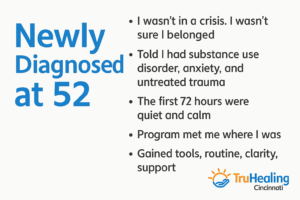I didn’t expect to hear the words “You qualify for residential treatment” at 52.
I wasn’t in the middle of a crisis. I didn’t have a DUI. I hadn’t lost my job. I wasn’t even sure I belonged in a place like that.
I had just been diagnosed—with substance use disorder, anxiety, and what they gently called “long-standing, untreated trauma.” I left the clinic with a folder full of resources and a tight feeling in my chest.
Wasn’t I too old for this? Hadn’t I gone too long without getting help? Wouldn’t people look at me like I’d wasted decades?
If you’re asking yourself the same questions, let me tell you what actually happens when you say yes anyway.
Why I Didn’t Think I Deserved a Residential Program
I spent years convincing myself that what I was doing was “managing.”
I showed up to work. Paid the bills. Checked on my kids. Avoided calls when I didn’t have the energy. Drank just enough to sleep. Smiled just enough to pass. I even kept a handle on the worst of it—until I couldn’t.
The diagnosis came after a routine medical check led to a referral to a mental health professional. The drinking was part of it, sure. But it was the emptiness that scared me more. The flatness. The way I couldn’t remember the last time I’d felt anything real.
Still, I thought residential care was for younger people. Or people in legal trouble. Or people with “more severe” symptoms.
I didn’t think someone like me would be accepted. I definitely didn’t think I’d be welcomed.
But I was.
The First 72 Hours Were Quiet, Not Chaotic
I expected fluorescent lights, impersonal staff, roommates half my age. Instead, I got stillness.
TruHealing Cincinnati is set up to feel like a calm in the storm. Not sterile. Not frantic. Just… held.
I arrived with a bag, a blank expression, and zero expectations. What I remember most is how gently people spoke to me. No rush. No pressure. Just: “Let’s help you get settled.”
I slept for twelve hours that first night. I hadn’t realized how long it had been since my body felt safe enough to rest.
Being the Oldest One Didn’t Make Me Invisible
I was the oldest in my group. That part was true. But it didn’t make me irrelevant. It made me real.
Others came in younger, louder, more raw. Some had been to treatment before. Some reminded me of my son. Some reminded me of me at 25. But when I spoke, people listened. And when I didn’t, no one pushed.
One group member—a 33-year-old former EMT—told me,
“I hope I have your guts when I’m your age.”
I wasn’t a sideshow. I wasn’t a stereotype. I was just one more person trying to heal.
I Didn’t Have to “Buy In” All at Once
If you’re newly diagnosed, you know the feeling: doubt. Suspicion. That weight of, “Is this really me?”
I questioned everything for the first week. My diagnosis. My therapist. Whether I could really change after so long. I felt like a fraud sitting in a circle talking about “recovery.”
But the magic of residential treatment isn’t overnight transformation. It’s exposure. Gentle, repeated reminders that healing is possible—even if you don’t believe it yet.
It’s a counselor saying, “You don’t have to feel ready to start.” It’s a peer saying, “Yeah, I was scared of meds too.” It’s waking up one morning and realizing you don’t hate yourself for breathing.

The Program Met Me Where I Was
I didn’t want a one-size-fits-all plan. I wanted to be seen—not just treated.
TruHealing’s staff helped shape my schedule around my actual needs. That included:
- Individual therapy three times a week
- Group therapy focused on trauma, not just substance use
- Gentle movement therapy (helpful for my aging knees)
- Medication support that respected my fear of numbing out
- Case management to help plan next steps after discharge
They didn’t assume I was starting from scratch. They helped me work from where I actually was.
What I Gained (Besides Sobriety)
I didn’t leave residential treatment as a new man. I left as a man who knew himself again.
I gained:
- A routine that calms instead of controls
- Clarity about my emotional patterns
- Tools to manage cravings and grief
- A support plan I actually believe in
- A handful of people I still text when I need to check my own BS
I left feeling like I’d rejoined my own life—not just stayed sober.
Life After Treatment in Cincinnati—and Beyond
When it came time to leave, the team helped me transition into a lower level of care. I enrolled in an IOP close to my home in Lexington, Kentucky, but TruHealing kept in touch for weeks after.
They didn’t disappear when I walked out the door.
They helped me build a bridge—from “newly diagnosed” to “newly living.”
And that bridge started at 52.
FAQs: Getting Diagnosed Later in Life and Starting Residential Treatment
Is residential treatment really appropriate for people in their 50s or older?
Yes. Healing doesn’t have an age limit. Many of our clients are in their 40s, 50s, or beyond—navigating addiction, anxiety, depression, trauma, or long-ignored emotional pain.
What if I’ve never been to therapy before?
That’s okay. Residential treatment includes support for people who are just beginning their mental health journey. You don’t need experience—you need willingness.
Is medication required in residential care?
No. We respect each person’s comfort level. Medication may be discussed if it could help, but you’ll never be forced to take something without informed consent.
Can I afford to be away from home this long?
We help with FMLA and other leave documentation. Your care team will work with you to plan a stay that’s realistic—typically 28–45 days.
Is it too late to change after decades of unhealthy habits?
Not at all. We see real, lasting shifts in people who assumed they were too far gone. It’s not about perfection. It’s about deciding it matters now.
If You’re Scared, You’re Not Alone. But You’re Not Too Late.
If you’re newly diagnosed and feeling overwhelmed—if the thought of residential treatment makes you want to disappear—you’re exactly the kind of person this place is for.
It’s not about being ready. It’s about being willing to stop running. Even for a minute.
Call (888) 643-9118 or visit our residential treatment program in Cincinnati, Ohio to learn more. You’re not too late. You’re right on time.

